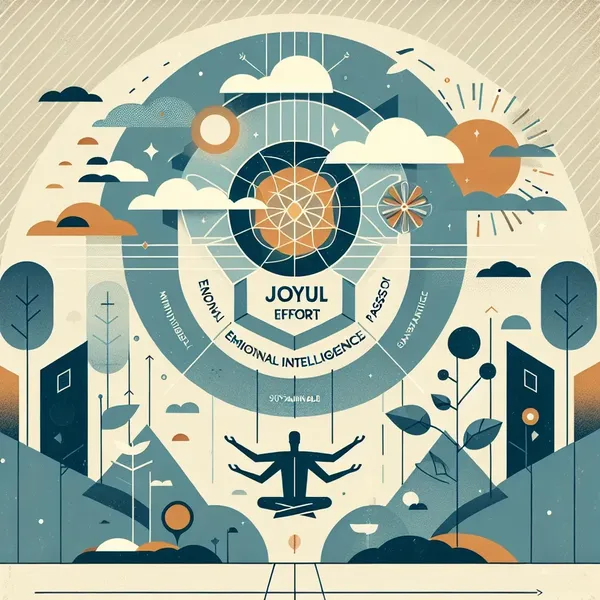
Ready to Start Your Wellness Journey?
Become a Herbalife Preferred Member and enjoy exclusive discounts of up to 25% on all products.
BECOME A PREFERRED MEMBERJoyful Effort: Mindfulness for Sustainable Success and Growth
In today's high-paced environment, achieving sustainable growth in personal and professional life often feels overwhelming. We strive to meet goals, enhance productivity, and build harmonious relationships, yet the process frequently drains our energy. Enter the transformative concept of "Joyful Effort", a unique approach combining determination with mindfulness and emotional intelligence. Embracing joyful effort allows us to pursue goals passionately, avoiding burnout and fostering resilience. This article explores how applying joyful effort can enhance personal growth, leadership skills, wellness, relationships, and productivity, providing actionable insights to unlock your full potential.
Understanding Joyful Effort
A Historical Context
The term "Joyful Effort" originates from Buddhist teachings, where it emphasizes a joyous and wholehearted approach to life and personal development. Known as virya in Sanskrit, joyful effort embodies enthusiasm, perseverance, and mindful dedication. Ancient traditions valued joyful effort, recognizing the importance of blending disciplined practice with intrinsic enjoyment, making challenges manageable and efforts sustaining, as detailed in Thích Nhất Hạnh's influential book "The Miracle of Mindfulness".
Current Relevance in Our Lives
In the modern context, joyful effort is increasingly relevant amid widespread burnout, constant stress, and diminishing work-life balance. Research in emotional intelligence highlights how positively framing our tasks improves our mental health, productivity, and overall wellbeing. Rather than grim resilience, joyful effort encourages enthusiastic engagement, reducing stress and enhancing fulfillment—key elements sought in today's dynamic workplace and personal lives.
Practical Application of Joyful Effort
Step-by-Step Guide to Incorporating Joyful Effort
Applying joyful effort requires intentionally shaping your mindset and habits to interweave enthusiasm with disciplined action. Here's a step-by-step guide:
• Clarify Your Purpose: Clearly define what gives your activities meaning and value, aligning them with your core values to foster intrinsic motivation.
• Mindfulness Practices: Begin daily mindfulness practices like meditation or mindful breathing from "The Miracle of Mindfulness" to establish mental clarity and alleviate stress.
• Cultivate Emotional Intelligence: Build emotional awareness, recognizing triggers causing resistance or procrastination. Embrace positivity by consciously reframing challenges as opportunities for growth.
• Set Realistic Goals and Milestones: Break ambitious projects into manageable milestones to regularly experience satisfaction, fueling ongoing enthusiasm and commitment.
Common Challenges and How to Overcome Them
Despite our best intentions, several challenges may emerge when embedding joyful effort into our routines:
• Negative Habits: Breaking unproductive habits requires conscious intervention and repeated practice until joyful effort becomes second nature. Encourage yourself through positive reinforcement and compassionate self-talk.
• Lack of Motivation: Revitalize your purpose regularly; remind yourself why your goal matters deeply, reconnecting with intrinsic satisfaction.
• Stress and Burnout: Incorporate strategic rest and mindfulness techniques into daily routines to avoid exhaustion and promote sustainable energy levels.
Success Stories: Real-Life Examples of Joyful Effort
Case Studies Demonstrating Its Value
Examining real-world examples affirms joyful effort's transformative impact. Consider startup founder Sarah Clarke, who revolutionized her company's culture, advocating joyful effort to reduce stress and increase innovation. By encouraging team members to pursue meaningful tasks enthusiastically, enhanced productivity and job satisfaction led to record-breaking growth.
Similarly, athlete Eliud Kipchoge attributes his marathon success to adopting joyful effort—joyful commitment maintained his energy, motivation, and enthusiasm, enabling sustained peak-performance over time without burnout.
Lessons Learned from These Examples
These inspiring examples illuminate critical lessons:
• Authentic enthusiasm significantly impacts productivity, well-being, and sustained success.
• Accessible daily practices create profound long-term transformation.
• Building joyful effort into team culture boosts morale and success, affirming its beneficial role in leadership settings.
Scientific Backing for Joyful Effort
Research Findings Explained
Extensive research underlines joyful effort's psychological and cognitive advantages. A study by Dr. Barbara Fredrickson at the University of North Carolina revealed how engaging in tasks positively stimulates resilience, reduces cortisol, and enhances innovative thinking. Joyful effort significantly decreases anxiety, promotes sound decision-making skills, and boosts total mental agility, creating healthier cognitive patterns.
Expert Opinions Supporting Joyful Effort
Leading experts like Daniel Goleman, emotional intelligence author, echo joyful effort's value. Goleman emphasizes that emotionally intelligent individuals actively cultivate enjoyable engagement, significantly improving personal and career success rates. Mindfulness leader Jon Kabat-Zinn similarly recognizes joyful effort as foundational in maintaining long-term mental wellness and life satisfaction.
Action Plan to Implement Joyful Effort into Your Life
Implementation Strategies
Establish joyful effort practically with these approachable strategies:
• Daily Mindfulness: Commit to regular mindfulness meditation sessions, as outlined in "The Miracle of Mindfulness", for cultivating presence and reducing stress.
• Joyful Task Framing: Consciously reframe tasks positively, connecting mundane actions to broader aspirations and intrinsic joy.
• Reflective Journaling: Regularly reflect on progress and obstacles in a journal, identifying areas requiring increased mindfulness and emotional awareness.
Measuring Progress Effectively
Monitor the effectiveness of joyful effort implementation:
• Track emotional well-being regularly via mood tracking apps.
• Record productivity achievements and setbacks, noting how joyfully approaching tasks enhances output.
• Gather feedback from colleagues, friends, or family regarding behavioral changes observed through your joyful engagement.
Conclusion
Joyful effort transcends being a passing motivational trend—it is a psychological strategy grounded in mindfulness and emotional intelligence proven to enhance productivity, resilience, and personal satisfaction. Drawing from historical wisdom and modern research, practicing joyful effort empowers individuals and leaders to authentically engage with their goals, positively impacting daily activities and overall life quality. By intentionally adopting a mindfulness approach, practicing emotional intelligence, and forming joyfully disciplined habits, you unlock sustainable growth and fulfillment, transforming both personal and professional worlds.
"People usually consider walking on water or thin air a miracle. But I think the real miracle is not to walk either on water or thin air but to walk joyfully on earth." – Thích Nhất Hạnh, The Miracle of Mindfulness
Ready to Start Your Wellness Journey?
Become a Herbalife Preferred Member and enjoy exclusive discounts of up to 25% on all products.
BECOME A PREFERRED MEMBER